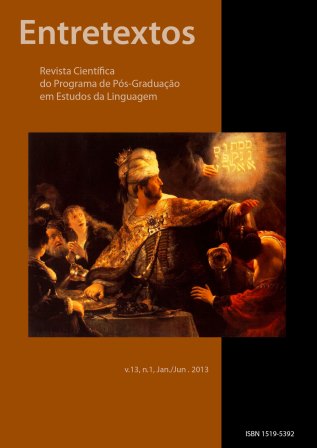The mythical matter of the proper name
DOI:
https://doi.org/10.5433/1519-5392.2013v13n1p137Keywords:
Silence, Power, Proper name, BabelAbstract
This essay focuses on the matter of the silence and the power in mythical and theological inheritance of the proper name as essentially a linguistic issue, taking as a basis some critics and authors who, more or less directly, approach the theme. Among them, Paul Ricoeur, Friedrich Nietzsche, Ernest Cassirer, Michel Foucault, John Searle, Maurice Blanchot and Jacques Derrida. We seek to plural interpretations about the myth of the Tower of Babel in order to enliven senses for peculiarities of this remote and unfinished philosophical theme. The proper name is sacred revelation of the nameless, unnamable, that inhabits the text, which inhabits the other, which inhabits the city of Babel. The myth of Babel symbolizes the foundation of the community. The community where the relationship between itself and other occurs in the inevitable abyss of nomination. The other is just a named presence, at same time, an unnameable.Downloads
References
BLANCHOT, Maurice. A conversa Infinita. A palavra Plural. Trad. Aurélio Guerra Neto. São Paulo: Escuta, 2001
BUCH-JEPSEN, Niels. Le Nom propre et le propre auteur. Qu'est-se qu'une 'fonction-auteur? In: JACQUES-LEFEVRE, Nicole; REGARD, Frédéric. Une histoire de la 'fonction-auteur' est-elle possible? Saint-Étienne: L'Université de SaintÉtienne, 2001.
BENJAMIN, Walter. O narrador: considerações sobre a obra de Nikolai Leskov. In: BENJAMIN, Walter. Magia e técnica, arte e política: ensaios sobre literatura e história da cultura. trad. Sérgio Paulo Rouanet. 7 ed. São Paulo: Brasiliense, 1997.
CAMPILLO, Antonio. El autor, la ficción, la verdad. Revista de Filosofia, Múrcia, 1992. v. 5 .
CASSIRER, Ernest. Linguagem e Mito. São Paulo: Perspectiva, 2000.
DEBRAY, Régis. Deus, um itinerário. Material para a história do Eterno ocidente. Trad. Jônatas Batista Neto. São Paulo: Companhia das Letras, 2004.
DELEGUE, Yves. La revolution de l'image: le discours devalue. In: DELEGUE, Yves. La Perte des Mots. Essai sur la naissance de la 'littérature' aux XVIe et XVIIe siècles. Strasbourg: Presses Universitaires de Strasbourg, 1990. Chap. II.
DERRIDA, Jacques. Torres de Babel. Trad. Junia Barreto. Belo Horizonte: Editora UFMG, 2002.
GOMES, Daniel de Oliveira, SOUZA, Pedro de. (Org.). Foucault com outros nomes. Lugares de enunciação. Ponta Grossa: UEPG, 2009.
UIMARÃES, Eduardo. Semântica do Acontecimento. Campinas: Pontes, 2002.
HAROCHE, Claudine. Análise crítica dos fundamentos da forma sujeito (de direito). In: HAROCHE, Claudine. Fazer dizer, querer dizer. Trad. Eni Pulcinelli Orlandi. São Paulo: Hucitec, 1992.
KERBS, Raúl. El silêncio y la existência discursiva de Dios en la hermenéutica. Areté: Revista de Filosofia, Perú, v. 12, n. 2, 2000.
LAPIERRE, Nicole. Changer de nom. Paris: Gallimard, 2006.
PACHECO, Olandina M. C. de Assis. Sujeito e Singularidade. Ensaio sobre a construção da diferença. Rio de Janeiro: Jorge Zahar Editor, 1996.
POCA, Anna. La latencia o la ficción de verdade. Sobre el método del discurso de M.Blanchot. Revista de Filosofia, Múrcia, v. 5, 1992.
RESWEBER, Jean-Paul. A Fala. In: RESWEBER, Jean-Paul. A Filosofia da Linguagem. Trad. Yvone Toledo e José Paulo Paes. São Paulo: Cultrix, 1982.
SEARLE, John R. Nomes Próprios e Intencionalidade. In: SEARLE, John R. Intencionalidade. São Paulo: Martins Fontes, 2002.
SLOTERDIJK, P. En el mismo Barco. Ensayo sobre la hiperpolítica. Madrid: Siruela, 2000. TÉLLEZ, Magaldy. A Paradoxal comunidade por-vir. In: LARROSA, Jorge; SKLIAR, Carlos. Habitantes de Babel: políticas e poéticas da diferença. Belo Horizonte: Autêntica, 2001.
WAHNÓN, Sultana. Lenguaje y Literatura, Barcelona: Ediciones Octaedro, 1995.
Downloads
Published
How to Cite
Issue
Section
License
Copyright (c) 2013 Entretextos

This work is licensed under a Creative Commons Attribution 4.0 International License.
Entretextos adota a Licença Creative Commons Attribution 4.0 International, portanto, os direitos autorais relativos aos artigos publicados são do/s autor/es.
Sob essa licença é possível: Compartilhar - copiar e redistribuir o material em qualquer suporte ou formato. Adaptar - remixar, transformar, e criar a partir do material, atribuindo o devido crédito e prover um link para a licença e indicar se mudanças foram feitas.























